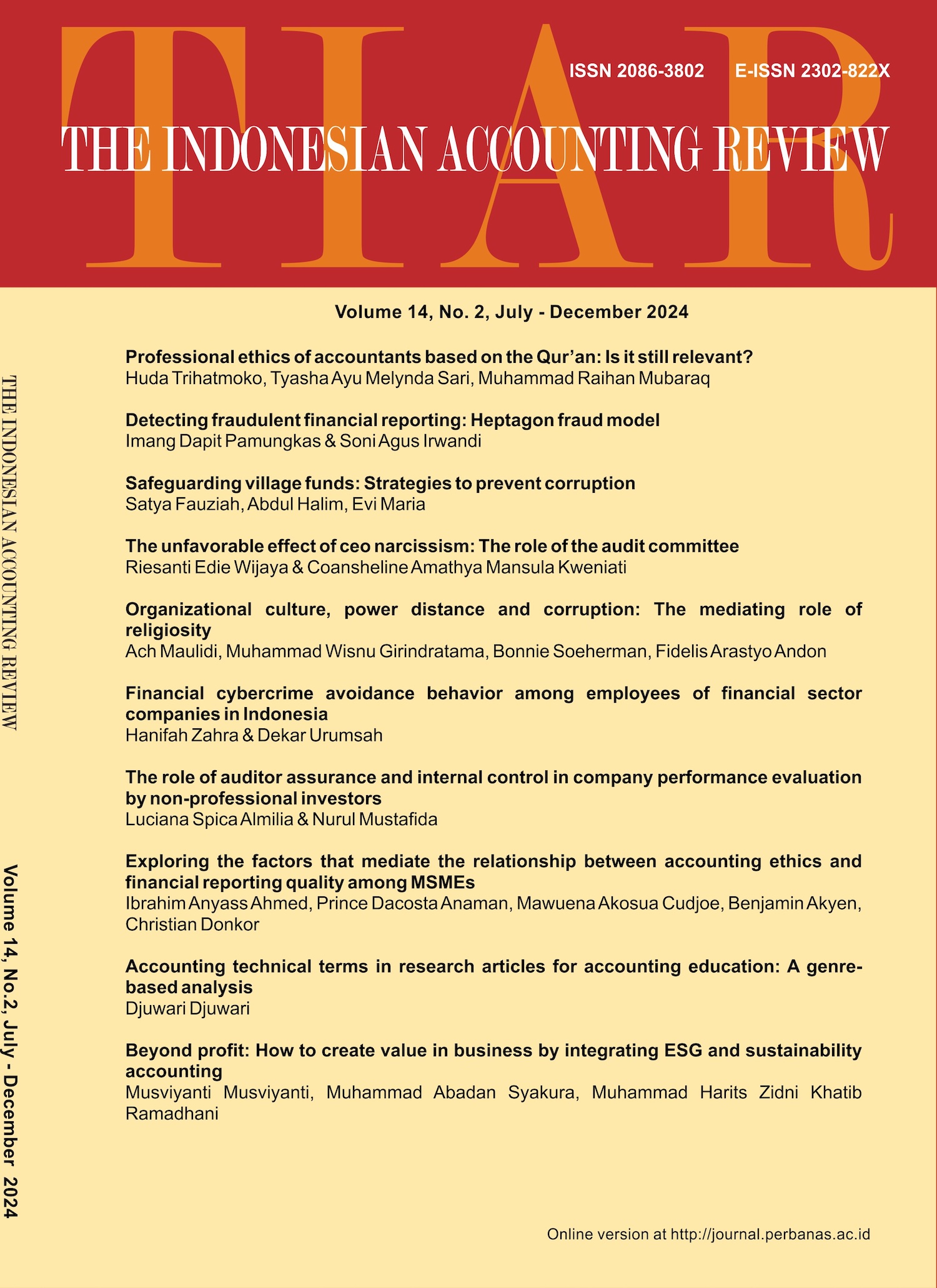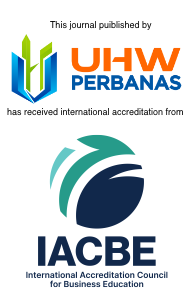Accounting Technical Terms in Research Articles for Accounting Education: a Genre-Based Analysis
DOI:
https://doi.org/10.14414/tiar.v14i2.4606Keywords:
Accounting education, Accounting technical terms, Accounting research articles (ARAs), Genre-based analysis (GBA), Rhetorical movesAbstract
The importance of technical terms in the accounting field has garnered global attention, particularly for accounting education. Mastery of these specialized terms, which are commonly found in accounting research articles (ARAs), is essential for both students and researchers in the field. This study examines ARAs to identify the specific technical terms present in the introduction sections of various sub-genres of these articles. Data was collected from international journal articles available on Google Scholar and analyzed using genre-based analysis (GBA). The researchers first examined the rhetorical moves within each article, then identified the technical terms associated with these moves, and finally drew conclusions based on their findings. The study revealed that all ARAs included the complete set of rhetorical moves recommended for research articles, each containing specific accounting technical terms. In total, 99 technical terms were identified across 10 RAs, distributed throughout the rhetorical moves. This finding is particularly relevant for novice researchers and accounting educators. It is recommended that the accounting educators consider the technical term in the curriculum for accounting education. Besides that, for further research, researchers should also undertake similar studies for a broader perspective in accounting education.
References
Aleshinskaya, E. (2023). Research Result. Theoretical And Applied Linguistics. Research Result. Theoretical And Applied Linguistics Учредители: Белгородский Государственный Национальный Исследовательский Университет, 9(3), 53-64.
Azar, A. S., & Hashim, A. (2022). Analyzing authorial identity construction in the review article genre in Applied Linguistics. Studies in English Language and Education, 9(1), 94-114.
Aisbitt, S., & Nobes, C. (2001). The true and fair view requirement in recent national implementations. Accounting and Business Research, 31(2), 83-90.
Bhatia, V. K. (1993). Analyzing Genre: Language Use in Professional Settings. Longman.
Bhatia, V. K. (2023). Critical genre analysis of professional discourse. In The Routledge Handbook of Discourse Analysis (pp. 358-372). Routledge.
Bochkay, K., Brown, S. V., Leone, A. J., & Tucker, J. W. (2023). Textual analysis in accounting: What's next?. Contemporary accounting research, 40(2), 765-805.
Baskerville, R. F., & Evans, L. (2011). The darkening glass: Issues for translation of IFRS. Edinburgh University Press.
Çapkın, Ç. (2024). Trends in genre analysis articles on scientific abstract structures: A Quantitative content analysis. Journal of Librarianship and Information Science, 56(1), 71-82.
Djuwari, Saputri, T., & Authar, N. (2022). A Comparative Study of Rhetorical Moves In Introduction Sections of International Journal Articles. Specialusis Ugdymas, 1(43), 5617-5629.
Evans, L. (2004). Language, translation and the problem of international accounting communication. Accounting, Auditing & Accountability Journal, 17(2), 210-248.
Fülbier, R. U., & Sellhorn, T. (2023). Understanding and improving the language of business: How accounting and corporate reporting research can better serve business and society. Journal of Business Economics, 93(6), 1089-1124.
Flowerdew, J. (2023). John Flowerdew's essential bookshelf: English for research publication purposes (ERPP). Language Teaching, 1-11.
Gulzar, M. N. (2023). A Generic Patterns in Discussion Sections: A Corpus-Based Analysis of Academic Moves Structures in Dissertations in Pakistan. CORPORUM: Journal of Corpus Linguistics, 6(2), 1-21.
Hyland, K. (2002). Genre: Language, context, and literacy. Annual review of applied linguistics, 22(1), 113-135.
Hyland, K. (2004). Genre and second language writing. University of Michigan Press.
Jiang, Y., & Li, X. (2018). A corpus-based study of accounting vocabulary for ESP learners. English for Specific Purposes Journal, 50(2), 23–35.
Jones, M. J., & Dugdale, D. (2001). The concept of an accounting regime. Accounting, Auditing & Accountability Journal, 14(3), 251-277.
Kermis, G., & Kermis, M. (2010). Professional Presence and Soft Skills: A Role for Accounting Education. Journal of Instructional Pedagogies, 2.
Kim, H., Park, J., & Lee, S. (2019). Cross-cultural analysis of accounting terminology: Implications for ESP teaching. International Journal of Applied Linguistics, 29(1), 71–87.
Kozka, I., & Krasnikova, S. (2020). Application of theory of genres in tackling professional medical discourses. Teaching Languages at Higher Educational Establishments at the Present Stage. Intersubject Relations, (36), 83-98.
Laaksonen, J. (2022). Translation, hegemony and accounting: A critical research framework with an illustration from the IFRS context. Critical Perspectives on Accounting, 89, 102352.
Lubbe, I. (2013). Educating accounting professionals: Development of a theoretical framework as a language of description of accounting knowledge production and its implications for accounting academics at South African universities. South African Journal of Accounting Research, 27(1), 87-124.
Martinez, L., & Buhmann, C. (2020). Terminology and lexical ambiguity in accounting texts: A study in ESP education. Journal of Applied Linguistics and Professional Practice, 12(3), 355–370.
Martinkovič, M. (2022). Genre-Specific Irrealia in Translation: Can Irrealia Help Define Speculative Fiction Sub-Genres?. English Studies at NBU, 8(1), 73-92.
Malekzadeh, M. (2020). Genre Analysis of Article Abstract Sections across Translation Studies and English Literature. LANGUAGE ART, 5(1), 101-114.
McDonough, R., Panaretou, A., & Shakespeare, C. (2020). Fair value accounting: Current practice and perspectives for future research. Journal of Business Finance & Accounting, 47(3-4), 303-332.
Moses, O., & Hopper, T. (2022). Accounting articles on developing countries in ranked English language journals: a meta-review. Accounting, Auditing & Accountability Journal, 35(4), 1035-1060.
Motschenbacher, H. (2020). Corpus Linguistic Onomastics: A Plea for a Corpus-Based Investigation of Names. Names, 68(2), 88-103.
Ortikov, U. (2023). Practical Uses of Corpus Analysis In Designing Language Teaching Materials. Oriental renaissance: Innovative, educational, natural and social sciences, 3(7), 304-309.
Olagunju, S. (2022). Issues in Genre Analysis and Genre Evolution within the Discursive and Social Practices. International Journal of Arts, Languages, Linguistics and Literary Studies, 11(2).
Saeed, M. K., & Dawood, M. A. (2022). A Genre Analysis of Literature Books Blurbs. Nasaq, 36(6).
Samraj, B. (2002). Introductions in research articles: Variations across disciplines. English for specific purposes, 21(1), 1-17.
Xia, S. A. (2020). English for specific purposes in the digital era: What has changed? Interview with Vijay Bhatia. RELC Journal, 51(1), 188-197.
Zeff, S. A. (2012). The evolution of the IASC into the IASB, and the challenges it faces. The Accounting Review, 87(3), 807-837.
Downloads
Submitted
Published
Issue
Section
License
Copyright (c) 2025 The Indonesian Accounting Review

This work is licensed under a Creative Commons Attribution-NonCommercial 4.0 International License.
















